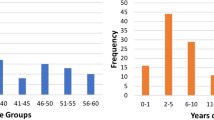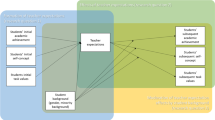Abstract
The aim of this mixed methods study was to explore the relationship between teacher expectations and student ethnicity. Factors that contributed to the achievement gap were also investigated. The study involved 15 mathematics teachers and 361 students from five urban secondary schools in Auckland. Fifteen teachers completed questionnaires and 10 teachers also participated in semi-structured interviews. Findings revealed that teachers’ expectations differed depending on the ethnicity of the student, even when controlling for achievement. Expectations were highest for Asian and Pākehā students, and lowest for Pasifika and Māori. Interviews with teachers confirmed lower expectations for Māori. Eight out of 10 teachers interviewed believed there were deficits in Māori and Pasifika students’ home backgrounds and that they lacked goals, motivation and aspirations. When asked about the achievement gap, all 10 teachers again referred to perceived deficits in Māori and Pasifika home backgrounds, and students’ attitudes as contributing factors.
Similar content being viewed by others
References
Alton-Lee, A. (2003). Quality teaching for diverse students in schooling: Best evidence synthesis. Wellington: Ministry of Education.
Ameratunga, S., & Horner, J. (2011). ‘Asian’ and immigrant minority youth in Aotearoa/New Zealand. In Improving the transition: Reducing social and psychological morbidity during adolescence. A report from the Prime Minister’s Chief Science Advisor (pp. 169–176). Auckland: Office of the Prime Minister’s Science Advisory Committee.
Bevan-Brown, J. (2000). Running the gauntlet: A gifted Māori learner’s journey through secondary school. Paper presented at the Proceedings of the Now is the future, the gifted student in today’s secondary school conference.
Bishop, R. (2007). Te Kōtahitanga. Phase 3, Whānaungatanga: Establishing a culturally responsive pedagogy of relations in mainstream secondary school classrooms. Wellington: Ministry of Education, Research Division.
Bishop, R. (2011). Freeing ourselves. Rotterdam: Sense Publishers.
Bishop, R., Berryman, M., Cavanagh, T., & Teddy, L. (2009). Te Kotahitanga: Addressing educational disparities facing Māori students in New Zealand. Teaching and Teacher Education, 25(5), 734–742. doi:10.1016/j.tate.2009.01.009.
Bishop, R., Berryman, M., Tiakiwai, S., & Richardson, C. (2003). Te Kōtahitanga: The experiences of year 9 and 10 Māori students in mainstream classrooms. Wellington: Ministry of Education.
Braun, V., & Clarke, V. (2006). Using thematic analysis in psychology. Qualitative Research in Psychology, 3(2), 77–101. doi:10.1191/1478088706qp063oa.
Caygill, R., Marshall, N., & May, S. (2008). Pisa 2006: Mathematical literacy—How ready are our 15-year-olds for tomorrow’s world? Wellington: Ministry of Education. Retrieved from http://www.educationcounts.govt.nz/publications/series/PISA/PISA_2006/29012/7.
Cohen, J. (1988). Statistical power analysis for the behavioral sciences. Hillsdale, NJ: Lawrence Erlbaum Associates.
Creswell, J. W., & Plano Clark, V. (2007). Designing and conducting mixed methods research. Thousand Oaks, CA: Sage.
Delpit, L. (2012). Multiplication is for white people: Raising expectations for other people’s children. New York: New Press.
Diamond, J. B., Randolph, A., & Spillane, J. P. (2004). Teachers’ expectations and sense of responsibility for student learning: The importance of race, class, and organizational habitus. Anthropology & Education Quarterly, 35(1), 75–98. doi:10.1525/aeq.2004.35.1.75.
Ennis, C. D., & McCauley, M. T. (2002). Creating urban classroom communities worthy of trust. Journal of Curriculum Studies, 32(4), 149–172.
Gay, G. (2005). Educational equality for students of color. In J. A. Banks & C. A. McGee Banks (Eds.), Multicultural education: Issues and perspectives (5th ed., pp. 211–241). New Jersey: Wiley.
Good, T., & Nichols, S. (2001). Expectancy effects in the classroom: A special focus on improving the reading performance of minority students in first-grade classrooms. Educational Psychologist, 36(2), 113–126.
Hattie, J. (2003). New Zealand Education Snapshot with specific reference to the yrs 1–13 years. Paper presented at the Knowledge Wave 2003—the Leadership Forum, Auckland, New Zealand.
Hattie, J. (2005). What is the nature of evidence that makes a difference to learning? Paper presented at the Australian Council for Educational Research—Using data to support learning, Melbourne. http://research.acer.edu.au/research_conference_2005/7.
Hornby, G., & Witte, C. (2014). Ability grouping in New Zealand high schools: Are practices evidence-based? Preventing school failure: Alternative education for children and youth, 58(2), 90–95. doi:10.1080/1045988x.2013.782531.
Howard, T. C., & del Rosario, C. D. (2000). Talking race in teacher education: The need for racial dialogue in teacher education programs. Action in Teacher Education, 21(4), 127–137. doi:10.1080/01626620.2000.10462986.
Ireson, J., Hallam, S., & Hurley, C. (2005). What are the effects of ability grouping on GCSE attainment? British Educational Research Journal, 31(4), 443–458. doi:10.1080/01411920500148663.
Lee, S. J. (1994). Behind the model-minority stereotype: Voices of high- and low-achieving Asian American students. Anthropology & Education Quarterly, 25(4), 413–429. doi:10.1525/aeq.1994.25.4.04x0530j.
Linchevski, L., & Kutscher, B. (1998). Tell me with whom you’re learning, and I’ll tell you how much you’ve learned: Mixed-ability versus same-ability grouping in mathematics. Journal for Research in Mathematics Education, 29(5), 533–554.
Mahuika, R., Berryman, M., & Bishop, R. (2011). Issues of culture and assessment in New Zealand education pertaining to Maori students. Assessment Matters, 3(Annual), 183–198.
McKown, C., & Weinstein, R. S. (2002). Modeling the role of child ethnicity and gender in children’s differential response to teacher expectations. Journal of Applied Social Psychology, 32(1), 159–184. doi:10.1111/j.1559-1816.2002.tb01425.x.
Milner, H. R. (2012). Beyond a test score. Journal of Black Studies, 43(6), 693–718. doi:10.1177/0021934712442539.
Ministry of Education. (2008). A study of students’ transition from primary to secondary schooling. New Zealand Government. Retrieved from http://www.educationcounts.govt.nz/_data/assets/pdf_file/0016/31912/903_Trans-Summary.pdf.
Ministry of Education. (2010). e-asTTle teacher resources. TKI. Retrieved from http://e-asttle.tki.org.nz/Teacher-resources#r1.
Ministry of Education. (2013a). School decile ratings. Retrieved 2013, from http://www.minedu.govt.nz/Parents/AllAges/EducationInNZ/SchoolsInNewZealand/SchoolDecileRatings.aspx.
Ministry of Education. (2013b). The Maori Education Strategy: Ka Hikitia—Accelerating Success 2013–2017. Ministry of Education. Retrieved from http://www.minedu.govt.nz/theMinistry/PolicyAndStrategy/KaHikitia.aspx.
Ministry of Education. (2014a). Education Counts. Highest Attainment Numbers 2009–2012. Retrieved 2014, from http://www.educationcounts.govt.nz/statistics/schooling/senior-student-attainment/school_leavers2/highest-attainment-numbers.
Ministry of Education. (2014b). Education counts. Stand-downs, suspensions, exclusions and expulsions. Retrieved from http://www.educationcounts.govt.nz/indicators/definition/student-engagement-participation/3929.
Ministry of Education & New Zealand Teachers Council. (2011). Tātaiako: Cultural competencies for teachers of Māori Learners. Wellington: Ministry of Education.
NZQA. (2014). New Zealand Qualifications Authority Annual Report on NCEA and New Zealand Scholarship Data and Statistics (2013). Wellington: New Zealand Government. Retrieved from http://www.nzqa.govt.nz/assets/About-us/Publications/stats-reports/ncea-annualreport-2013.pdf.
Rubie-Davies, C. M., Hattie, J., & Hamilton, R. (2006). Expecting the best for students: Teacher expectations and academic outcomes. British Journal of Educational Psychology, 76(3), 429–444.
Rubie-Davies, C. M., Peterson, E. R., Flint, A., Garrett, L., McDonald, L., Watson, P., & O’Neill, H. (2012). Ethnicity and teacher expectations in New Zealand. Procedia—Social and Behavioral Sciences, 69, 256–261. http://www.sciencedirect.com/science/article/pii/S1877042812053931.
Rubie-Davies, C. M., Peterson, E. R., Irving, E., Widdowson, D., & Dixon, R. (2010). Expectations of achievement: Student, teacher and parent perceptions. Research in Education, 83(1), 36–53.
Rubie-Davies, C. M., Peterson, E. R., Sibley, C. G., & Rosenthal, R. (2015). A teacher expectation intervention: Modelling the practices of high expectation teachers. Contemporary Educational Psychology, 40, 72–85. doi:10.1016/j.cedpsych.2014.03.003.
Spiller, L. (2012). How can we teach them when they won’t listen? How teacher beliefs about Pasifika values and Pasifika ways of learning affect student behaviour and achievement. Set: Research Information for Teachers, 3, 58–66.
St. George, A. (1983). Teacher expectations and perceptions of Polynesian and Pakeha pupils and the relationship to classroom behaviour and school achievement. British Journal of Educational Psychology, 53(1), 48–59.
Webber, M. (2011). Identity matters: Racial-ethnic representations among adolescents attending multi-ethnic high schools. Ph.D. Thesis, University of Auckland.
Weinstein, R. S., Gregory, A., & Strambler, M. J. (2004). Intractable self-fulfilling prophecies. American Psychologist, 59(6), 511–520. doi:10.1037/0003-066x.59.6.511.
Author information
Authors and Affiliations
Corresponding author
Rights and permissions
About this article
Cite this article
Turner, H., Rubie-Davies, C.M. & Webber, M. Teacher Expectations, Ethnicity and the Achievement Gap. NZ J Educ Stud 50, 55–69 (2015). https://doi.org/10.1007/s40841-015-0004-1
Received:
Accepted:
Published:
Issue Date:
DOI: https://doi.org/10.1007/s40841-015-0004-1




